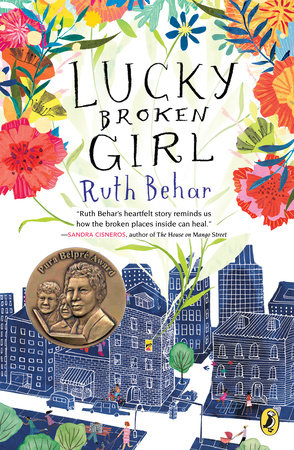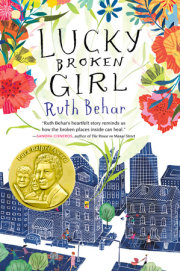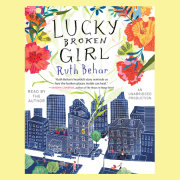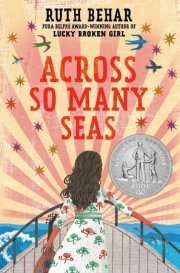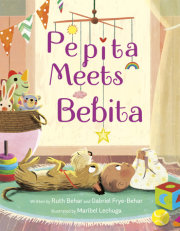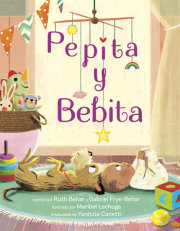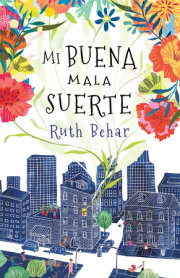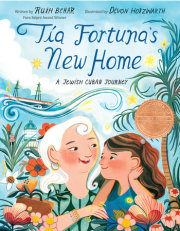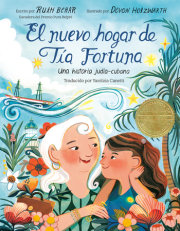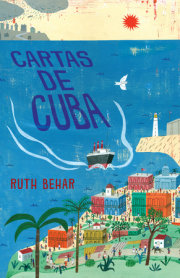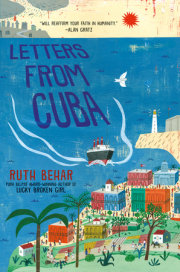Chapter 1: I am not dumbWhen we lived in Cuba, I was smart. But when we got to Queens, in New York City, in the United States of America, I became dumb, just because I couldn’t speak English.
So I got put in the dumb class in fifth grade at P.S. 117. It’s the class for the
bobos, the kids who failed at math and reading. Also in it are the kids the teachers call “delinquents.” They come to school late and talk back and are always chewing gum. Even though they’re considered the bad kids, most of them are nice to me. “Here, Ruthie, have some Chiclets!” they whisper and pass me a handful.
We aren’t supposed to chew gum in school, so we hold the Chiclets in our mouths until we go outside for recess. Then we chew the Chiclets to death and stick the gook on the bottom of our desks when we come back inside.
Most of the kids know I’m in this class because I’m from another country, not because I really belong there. Or maybe I do belong there? It’s been eight months since school started and our teacher promised I wouldn’t be in the class for long.
I am not dumb. I am not dumb. I am not dumb . . .
The first time I worked up the courage to raise my hand in class was a few weeks after we had arrived from Cuba and I was wearing flip-flops instead of shoes and socks like the other kids. But when our teacher, Mrs. Sarota, called on me to answer the math problem, I didn’t have the words to say the number in English.
“Well, Ruth?” she asked, staring down at my bare feet. “Do you know the answer or not?”
I froze and a few kids laughed at me. But not Ramu.
He’s not dumb either. Ramu is in our class because he’s also from a different country. He comes from India and was raised there by his grandmother, who only speaks a language called Bengali. His parents came to New York first, and after they made enough money, they brought Ramu and his little brother, Avik, here.
Ramu has picked up English faster than I have because his parents know English and force him to speak it at home. Mine are always yelling,
“¡Habla en español!” Especially Mami, who can understand a little English, but is usually too embarrassed to try to speak it.
Ramu is skinny and bows his head when anyone talks to him. I’m his only friend and that’s because he lives down the hall from us on the sixth floor of our apartment building. Ramu brings Avik to school and I bring my brother, Izzie. Our little brothers are in the same kindergarten class. But after school Ramu and Avik rush straight home. Mrs. Sharma doesn’t let them play with the other children.
Their apartment smells different from ours. I get whiffs of it whenever we stumble into each other on the way to school. Today when Ramu and Avik stepped into the hall, Izzie and I were waiting for the elevator, and I asked, “What is that perfume?”
“It’s my mother’s curry,” Ramu says.
“What’s curry?”
“A spice. It makes everything taste good, even cauliflower.”
“That’s amazing.”
“Yes, it is. And my mother burns sandalwood incense. She says it’s good for meditation and the spirits like it too.”
“Spirits?”
“People who used to be alive, when they’re not alive anymore, become spirits. My grandmother says they are all around us. We can’t see them but they watch over us. Of course, spirits don’t eat, but they can smell fragrant things like curry and incense.”
During lunch at the cafeteria, Ramu offers me something from his lunch box, a pastry filled with mashed potatoes his mother made.
“It’s a samosa,” Ramu tells me. “Maybe you’ll find it too spicy.”
Some kids at the table pretend to hold their noses. One says, “It smells like sweaty armpits!”
“No it doesn’t!” I shout back.
I take a slow first bite. It tastes like a
papa rellena, a crispy stuffed potato my nanny Caro made for me as a snack in Cuba. Eating Ramu’s samosa makes me feel like Caro and Cuba aren’t so far away.
“It’s real good! Thanks, Ramu.”
Ramu gives me a shy smile. “Very glad you like it.”
I beg Mami to make
pastelitos de guayaba after Izzie and I get home. The following day, I give Ramu one of the sweet pastries at lunch.
“The filling is guava fruit. I hope you’ll like it,” I tell him.
Ramu eats it slowly without saying a word. When he’s done, he finally says, “I like guavas. We have them in India too,” and I sigh.
“And do you have mangos in India?”
“Oh yes, drippy sweet mangos.”
“Just like in Cuba!”
“I don’t just miss the mangos,” Ramu says. “I miss being able to go outside and play with friends. My mother worries too much about us. She doesn’t let us do anything by ourselves.”
“I know what you mean. In Cuba, even when I was five years old, my mother used to let me take a taxi all by myself to go visit my aunt Zoila, who used to sew pretty dresses for me. Can you imagine?”
“Yes, here everything is different,” he says, with a faraway look in his eyes.
“But maybe one day we’ll both get to taste mangos in India and Cuba!” I say, trying to cheer him up.
“Oh, Ruthie, I like that you have such an imagination!”
Ramu and I sit together every afternoon after lunch period so we can practice our English.
Our favorite story is “The Princess Who Could Not Cry,” about a princess who is placed under an evil spell and forgets how to cry. She laughs at everything, even sad things. When they toss away all the toys she loves from the tallest tower of the castle, she laughs, even though she feels terrible.
A little ragged girl arrives and announces, “I’ve come to help the princess cry.”
The queen tells her, “Promise me you won’t hurt my daughter.”
The little ragged girl curtsies and replies, “I promise, Your Majesty, I will bring no harm upon your daughter. I just want to help her.”
She goes into a room with the princess and draws two onions out of her bag.
“Let’s peel these onions,” the little ragged girl tells the princess.
As the little ragged girl and the princess pull apart the layers of the onions, the tears start pouring from both their eyes.
That is how the princess learns to cry!
The evil spell is broken, and the little ragged girl and her poor mother are given a nice house next to the castle where they live happily ever after.
“That is the best story!” I say to Ramu as we finish reading aloud.
“Yes, it’s very fine,” he replies. “Very fine indeed.”
“Ramu, you always talk such a fancy English.”
“Like they do in England. It’s the Queen’s English, you see.”
“Yes! And now we live in Queens!” I say, joking.
“Very charming, Ruthie. That’s almost funny.”
“Let’s ask Mrs. Sarota to test us!” I tell Ramu.
“But will you ask her, Ruthie, please? You see, in India, we don’t talk to the teacher unless the teacher talks to us.”
“Okay, I will ask. I’m not afraid of the teacher.”
Mrs. Sarota comes to our desk and I say, “Me and Ramu are ready to switch into the smart class.”
“In English, we say ‘Ramu and I.’ ‘Me and Ramu’ is incorrect.”
I don’t lose my courage. I repeat, “Ramu and I are ready to switch into the smart class.”
“Is that so, young lady? Both of you?”
“Yeah, Mrs. Sarota,” I reply, trying to keep from giggling. Mrs. Sarota wears her hair in a big bird nest on top of her head and today it’s lopsided.
“Very well, young lady. Which of you can spell the word ‘commiserate’?”
Ramu gets it wrong, but I get it right—two
Ms and only one
S.
She doesn’t ask, but I also know what the word means. To “commiserate” is to feel sorry for somebody else’s bad luck.
“Very good, Ruth. I agree you’re ready to be promoted. But remember to say ‘yes’ rather than ‘yeah.’ On Monday, you can join the regular fifth-grade class.”
I see Ramu gazing sadly toward the floor. It’s not fair. He’s much better at English than I am. He talks like the Queen of England herself.
“Please, Mrs. Sarota, can you give Ramu another chance? Give him a harder word and see if he can spell it. Please.”
Mrs. Sarota’s eyes suddenly sparkle. “You said the magic word, ‘please.’ Ramu, can you spell the word ‘souvenir’?”
I would have gotten that word wrong, but Ramu knows how to spell it right.
“Excellent job, Ramu. You are also promoted,” Mrs. Sarota says. “On Monday, you and Ruth can join the regular fifth-grade class.”
“Mrs. Sarota, you are very kind,” Ramu says in his most polite voice.
Ramu gives me one of his shy smiles and that is enough of a thank-you for me.
I knew I wasn’t dumb. I knew Ramu wasn’t dumb either.
It’s Friday. After the weekend, when we come back to school, both of us will be in our new class with the smart kids.
Yippee!
I collect my schoolbooks and say good-bye to the other kids. One of them looks sad that I’m leaving and gives me some Chiclets. “You may need them!”
I wish all the kids could come with Ramu and me to the smart class. I don’t think any of them are really dumb. They just find school boring. They’d rather play all day.
In a chorus they call out, “Bye, Ruthie! Bye! Study hard or they’ll send you back here again!”
Copyright © 2017 by Ruth Behar. All rights reserved. No part of this excerpt may be reproduced or reprinted without permission in writing from the publisher.

